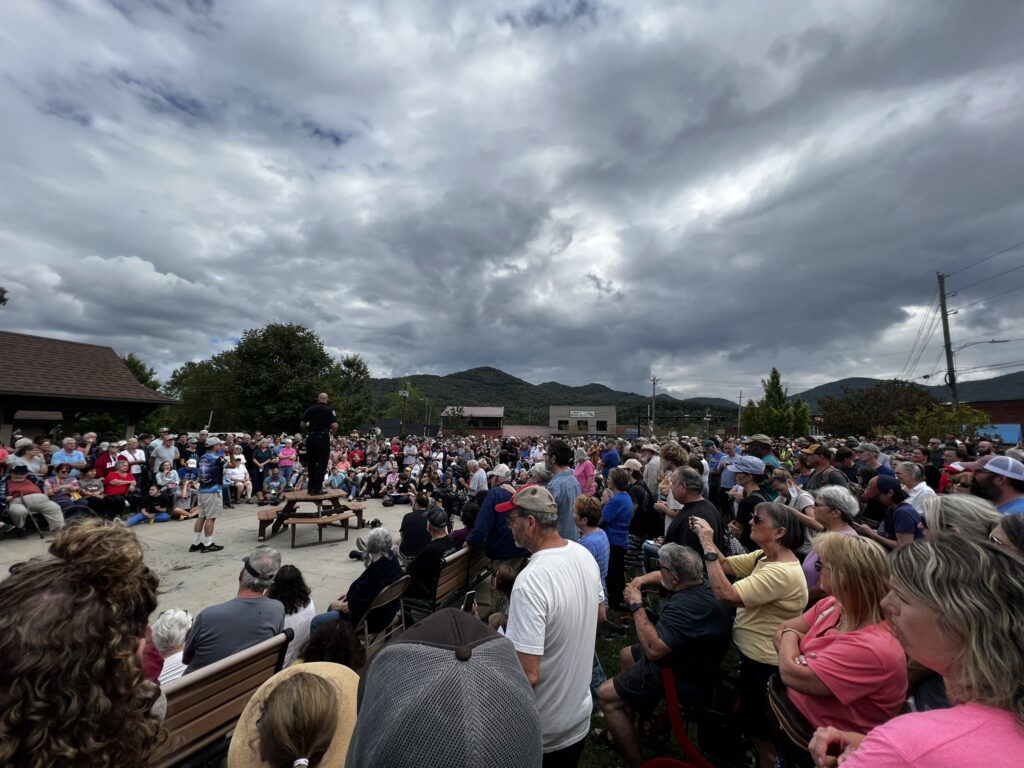In Black Mountain town leaders are getting information out with a method that’s been around for centuries.
By Jeremy Markovich
N.C. Rabbit Hole
I’ve been doomscrolling quite a bit lately, mostly because there seems to be no end to pictures of the destruction left behind by Hurricane Helene. Yet when I came across this picture from meteorologist Evan Fisher late Monday afternoon, I couldn’t get it out of my head.

What you’re seeing is a town meeting, held at 3 p.m. on a Monday in Black Mountain’s Town Square a couple weeks ago. Evan Fisher, a meteorologist who lives nearby, took a picture and tweeted out what the police chief, the fire chief, and other town leaders had to say.
The power might take weeks to come back on, they said. The sewage system on the French Broad River was completely destroyed. Highway 9 was gone in a lot of places, and I-40 remained closed to the east at the time. Gas was hard to come by, even for first responders, who were starting to end rescue missions and turning their efforts to recovery. [Editor’s Note: As of October 15, the town website says water has been reconnected but remains undrinkable and food establishments are closed.]
Still, the Ingles was back open and had food and water, and more supplies were available at the Cragmont Assembly. The news was useful, if not bleak. But the picture was astonishing. Here, in possibly the most technologically advanced nation in the world, people were getting vital information in the same way a town crier would have delivered it in medieval times.
A police officer stood up on a picnic table in the center of town, and told the hundreds of people around him what they needed to know.
With cell phone service and the internet largely out, how did people even know when and where to show up?
“Posters were out all over town,” Fisher told me via direct message Monday night. How did they even get there? “Most walked, some biked, some drove,” he said. Did everyone remain quiet? “For the most part,” Fisher said. “No one heckled, which was impressive. They did not open it up to round table questions, but they had folks answering individual questions afterwards.” Before that, Fisher sent out a picture of what appeared to be a white sheet hanging at Black Mountain Presbyterian Church, with the names of people who wanted others to know they were safe.
We’ve all gotten so accustomed to finding things out in the way that best suits our lives. We expect algorithms to deliver exactly what we expect to see. When technology fails us, it’s easy to feel lost, or isolated, or anxious. The further we get away from the way people used to do things, the less we actually remember what it was like, or how to do them.
But those things are still there and they still work when nothing else does. Modern naval ships still carry sextants just in case all of their navigation systems fail, and sailors need to calculate their positions by using the stars. Paper maps don’t require batteries. Radio, now a century-old technology, has been invaluable in helping people find out what’s going on and to reconnect with loved ones after Helene. People are communicating using walkie-talkies, and in some places, regularly gathering around sinkholes to tell each other what’s going on.
For all of the ways in which modern technology has brought the world closer to people, the best, and in many cases the only way to know what’s going on in places like Black Mountain is to see it, hear it, smell it, and feel the awful reality in person, and then describe it to others.
Slowly, some things are returning. Last night, Fisher tweeted out that power had started to come back on along the main road through Black Mountain, and cell service was intermittently working. I-40 east had reopened so people had another way to leave if they could. The town itself was posting information on its Facebook page and on its official website, and downtown seemed to be a place where services were available.
But a lot of people in Black Mountain and beyond still don’t have what they need. So once again town officials called another town meeting, at 3 p.m. in the town square where people will gather around a picnic table, and listen.
This column originally ran in N.C. Rabbit Hole on October 1. Subscribe at NCRabbitHole.com.